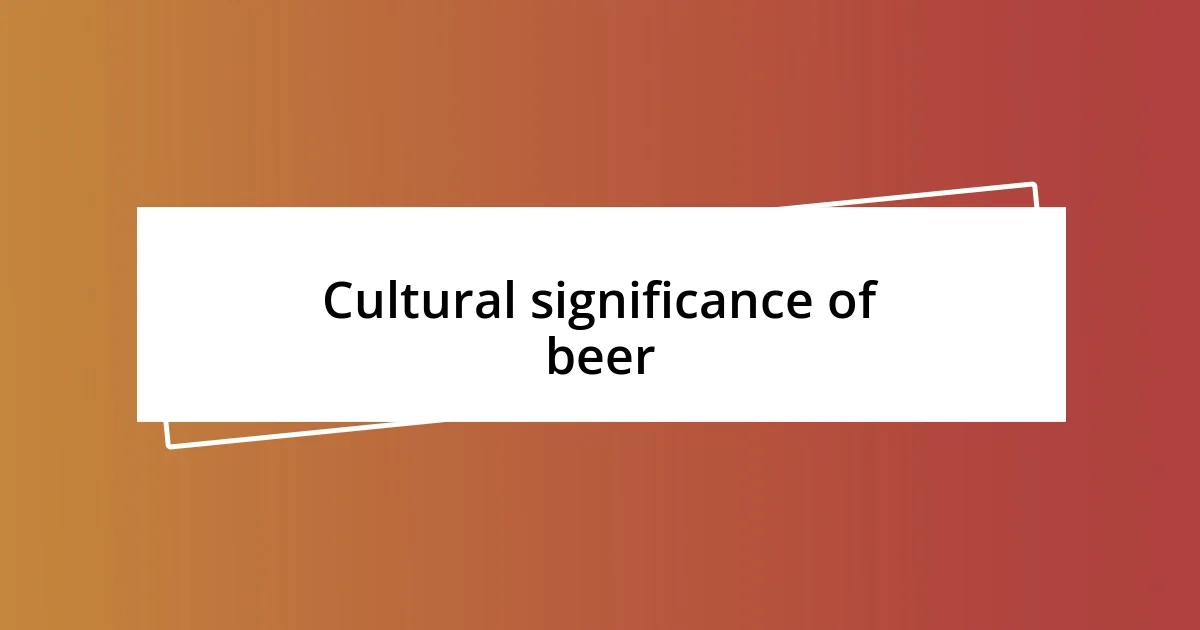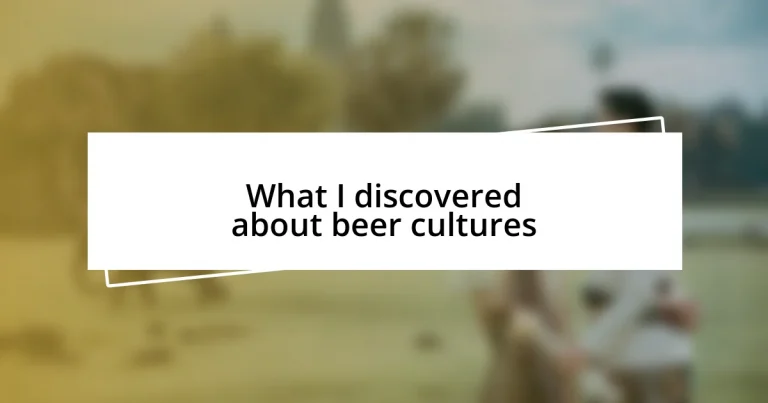Key takeaways:
- Beer cultures worldwide reflect local traditions, flavors, and histories, fostering connections and a sense of community among drinkers.
- The evolution of beer, from ancient Sumerians to modern craft brewers, showcases continuous refinement of techniques and styles, influenced by regional resources.
- Modern trends in beer culture include the rise of craft breweries, a focus on sustainability, and the integration of technology, enhancing appreciation and accessibility of diverse brews.

Introduction to beer cultures
Beer cultures around the world are as diverse and vibrant as the nations they originate from. I remember my first experience at a local beer festival, surrounded by people passionately discussing craft brews from their hometowns. It made me wonder—what is it about beer that sparks such connection among individuals?
Each region showcases its unique flavors, traditions, and brewing techniques, creating a rich tapestry of experiences that resonates with many. Have you ever tasted a Belgian Trappist ale while sitting in a rustic tavern, or perhaps indulged in an IPA crafted in the heart of Silicon Valley? Those moments aren’t just about the drink; they’re about shared laughter, stories, and a sense of belonging that comes when you raise a glass with friends.
I’ve found that beer cultures often reflect the values and history of a community. When I visited a small brewery in Germany, the pride in their craft was palpable, and it highlighted how beer can embody cultural heritage. It invites us to explore the stories behind each pint, making every sip a journey through time and place. Isn’t that a beautiful concept?

Historical origins of beer
Beer has deep historical roots that date back thousands of years. Archaeological evidence suggests that the Sumerians in Mesopotamia brewed a form of beer as early as 5,000 BCE. I remember feeling a sense of awe while standing in a small museum displaying ancient brewing artifacts; it truly brought to life the realization that people had been enjoying beer long before our modern societies were formed.
Throughout history, beer has played a vital role in various cultures, acting as more than just a refreshment. The Egyptians valued beer highly, integrating it into their daily diets and rituals. I fondly recall a trip to Egypt, where my guide shared stories of how workers on the pyramids were often paid in beer. It made me reflect on how this beverage has been a staple for many—a source of nourishment, celebration, and even currency.
As we delve deeper into the evolution of beer, we see its transformation across different civilizations. The brewing techniques have been refined over time, influenced by regional resources and cultural practices. I’ve been fascinated by the juxtaposition of ancient brewing methods and today’s craft beer movement. With each sip of a contemporary brew, I can’t help but appreciate the legacy that has shaped the flavors in my glass.
| Culture | Historical Context |
|---|---|
| Sumerians | First recorded brewers around 5,000 BCE |
| Egyptians | Integrated beer into diet and rituals |
| Various Civilizations | Refined brewing techniques over time, influencing modern craft beer |

Regional variations in beer styles
When exploring regional variations in beer styles, I am constantly amazed by how the local environment influences what we brew. For instance, the hoppy IPAs from the West Coast of the United States contrast so sharply with the rich, malty flavors found in traditional German bocks. I remember visiting a craft brewery in Oregon, where the brewmaster described how the region’s fresh hops shaped their flagship beer. It wasn’t just a conversation about brewing—there was an unmistakable passion in his voice that made me appreciate the artistry behind each bottle.
- West Coast IPAs: Bright and hoppy with a citrusy aroma, reflecting the local hop-growing region.
- German Bocks: Rich, malty, and often slightly sweet, showcasing the country’s long-standing brewing traditions.
- Belgian Ales: Unique yeast strains produce fruity and spicy flavors, deeply rooted in centuries-old brewing practices.
- Czech Pilsners: Crisp, clean, and balanced, they highlight the purity of the water local to the region.
- Sour Beers: Variably found in regions like Belgium and the U.S., each offering a unique balance of tartness and character.
Every style tells a story, whether it’s the crisp bite of a lager in a hot summer or the warming embrace of a stout during winter. Engaging with these regional flavors has taught me that enjoying beer transcends taste; it connects us to a community’s heritage and its people. Each sip carries with it the essence of the land, echoing the traditions and identities of those who brew it.

Cultural significance of beer
Beer holds a powerful cultural significance that transcends mere enjoyment. It serves as a bridge among people, sparking connections in social gatherings. I vividly recall attending a traditional Oktoberfest celebration in Munich, where the joyous atmosphere and clinking steins fostered friendships among strangers. In that moment, I realized that beer isn’t just a drink; it’s a catalyst for community and shared experiences.
In many cultures, beer is woven into the very fabric of identity and tradition. For instance, during my travels in Belgium, I was struck by how brewing was not only a craft but a familial heritage passed down through generations. As I sat in a quaint café, listening to a bartender recounting his grandfather’s methods, I felt a sense of pride in the legacy of craftsmanship. How amazing is it to think that every pint can tell a story of love, history, and local pride?
Beer often marks the milestones of life, from celebrations to rituals. I’ve participated in several beer-themed weddings and gatherings, each showcasing unique brews that represent the couple’s journey. It’s fascinating how a single bottle can evoke memories or symbolize an important moment. It prompts the question: what memories do your favorite beers carry? For me, every sip brings back laughter, stories, and the warmth of shared moments, reinforcing how beer is much more than a beverage; it’s a repository of experiences and a testament to human connection.

Social aspects of beer consumption
The social aspects of beer consumption are truly fascinating. I often find myself at local pubs, where the atmosphere buzzes with laughter and conversation. There’s something special about sharing a flight of craft beers with friends, each tasting sparking lively debates about flavors and preferences. It’s amazing how these moments foster camaraderie, lighting up the room with excitement as everyone takes turns sharing their thoughts.
During a recent gathering at a friend’s house, I vividly remember how we all gravitated towards the beer. As bottles popped open, the air filled with cheers and playful banter, enhancing the evening’s camaraderie. The act of passing around a unique brew often leads to sharing stories and experiences tied to that particular beer. Have you ever noticed how easily a conversation flows when everyone’s holding a cold one? In my experience, it creates an instant connection and a sense of belonging.
Beer also plays a crucial role in cultural celebrations. At my last summer barbecue, we decided to feature local breweries, and it became an exploration of flavors, regions, and styles. Each beer we selected was a conversation starter, inviting guests to share their preferences and discover new favorites together. It’s not just about what’s in the glass; it’s about how those pours unite us in shared experiences and create cherished memories that linger long after the last drop is gone. How incredible is it that one drink can draw us into such rich interactions? That’s the magic of beer culture for me—it’s the heart of social gatherings and connections that we create around it.

Modern trends in beer culture
One modern trend in beer culture that really stands out to me is the rise of craft breweries. I remember walking into a new local brewery, captivated by the creative labels and the scent of fresh hops filling the air. Each beer on the menu was a unique story, often inspired by local ingredients or themes. Isn’t it fascinating how these small-batch brewers are not just challenging traditional methods but also redefining what beer can be? Every pint, from a spicy saison to a decadent stout, feels like a personal exploration of flavors and cultures.
Another interesting shift is the increasing focus on sustainability within the brewing process. I’ve visited breweries that emphasize eco-friendly practices, like using renewable energy and sourcing organic ingredients. It’s heartwarming to see how they’re not just crafting excellent beers but also displaying a commitment to our planet. How often do we think about the impact our favorite beverages have on the environment? Personally, when sipping a sustainably brewed beer, I feel a deeper connection to the earth and its resources, knowing each sip supports a conscious choice.
Lastly, the incorporation of technology into beer culture has transformed how we engage with our favorite brews. I recently attended a virtual beer tasting where we paired various beers with delicious bites—all orchestrated through a live stream. It felt so innovative yet personal, as I joined fellow enthusiasts from all over the world. Isn’t it intriguing how technology can amplify our appreciation for beer? For me, this blending of tradition and modern innovation signifies that beer culture is evolving, making it more accessible while still honoring its rich roots.

Tips for exploring beer communities
Exploring beer communities can be a delightful adventure, filled with unique experiences. I remember my first visit to a local beer festival—walking among vibrant stalls, I could feel the excitement in the air as craft brewers proudly showcased their creations. Engaging with the brewers and asking questions about their processes made me appreciate the artistry behind each brew even more. Have you ever considered how a simple conversation can totally change your perspective on beer?
Joining online forums and local beer clubs is another excellent way to delve into these communities. I find that sharing tasting notes and personal experiences with fellow enthusiasts fosters an incredible bond. We share everything—from our favorite hidden gems to the latest trends and events. It’s like finding a new family that understands the joy of savoring every sip. What’s more thrilling than realizing you’re not alone in your quest for the perfect brew?
Lastly, never hesitate to try new styles and flavors that might initially seem out of your comfort zone. I remember the first time I encountered a sour beer; I was hesitant but curious. Taking that chance opened up an entirely new world of taste. It’s amazing how stepping outside your boundaries not only broadens your palate but also deepens your connection to beer culture. Have you dared to explore the unfamiliar in your own beer journey? Trust me, the surprises and discoveries waiting for you can be truly rewarding.














